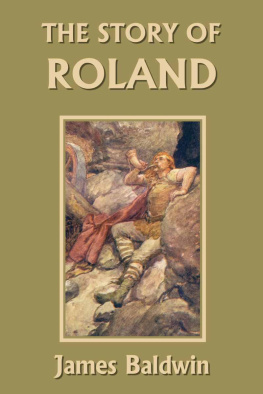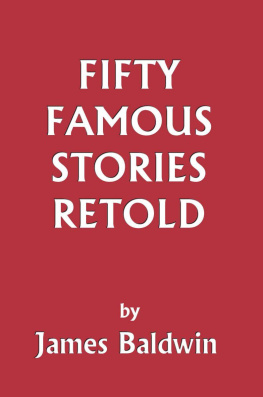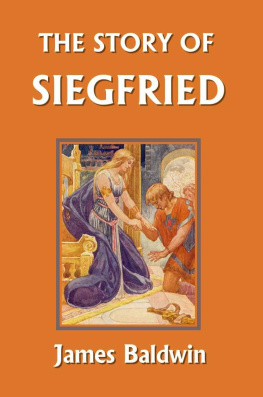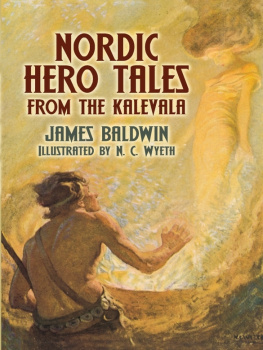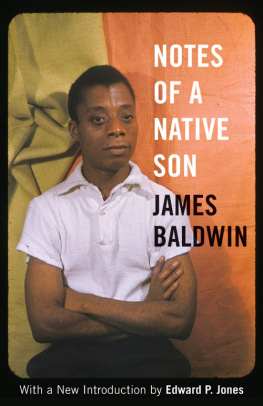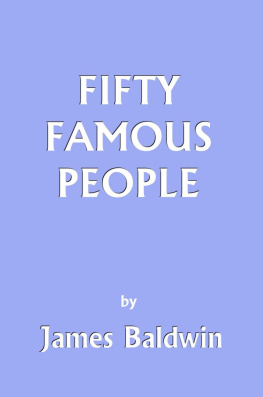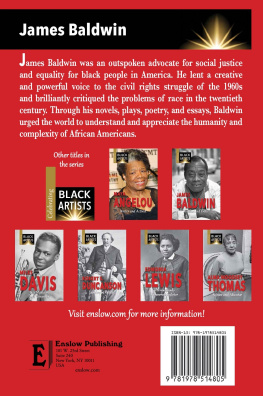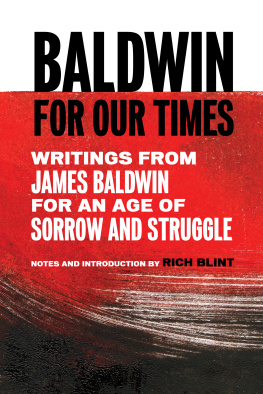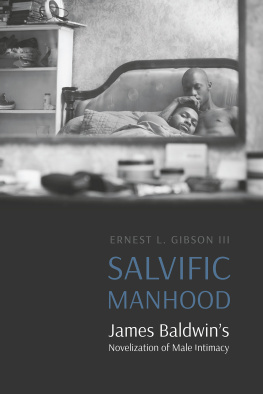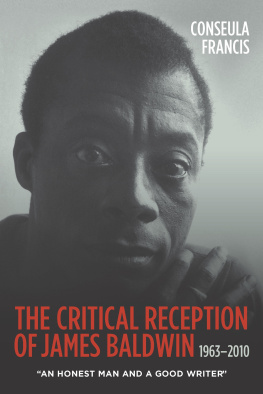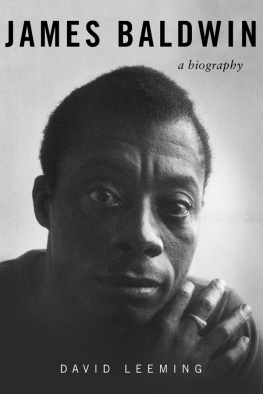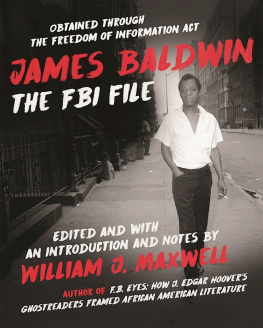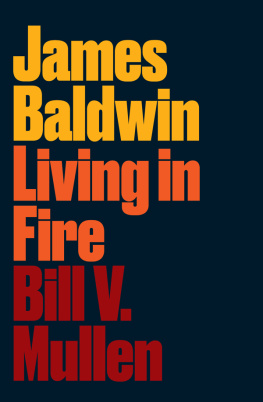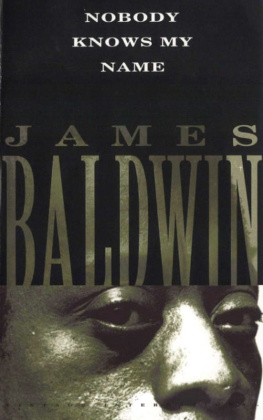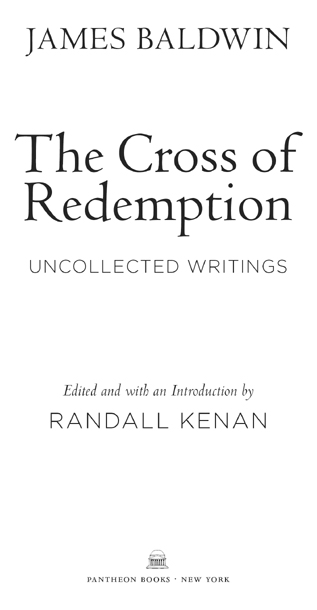Introduction and headnotes copyright 2010 by Randall Kenan
Compilation copyright 2010 by The Estate of James Baldwin
All rights reserved. Published in the United States by Pantheon Books, a division of Random House, Inc., New York, and in Canada by Random House of Canada Limited, Toronto.
Pantheon Books and colophon are registered trademarks of Random House, Inc.
Library of Congress Cataloging-in-Publication Data
Baldwin, James, 19241987.
The cross of redemption : uncollected writings / James Baldwin; edited and with an introduction by Randall Kenan.
p. cm.
A collection of essays, speeches, letters, reviews, etc.
eISBN: 978-0-307-37896-5
I. Kenan, Randall. II. Title.
PS3552.A45C76 2010
818.54dc22
2009050897
www.pantheonbooks.com
Cover photograph by Carl Mydans/Time Life Pictures/Getty Images
Cover design by Barbara de Wilde
v3.0_r1
The Estate of James Baldwin would like to extend appreciation to Erroll McDonald, Randall Kenan, Lily Evans, Eileen Ahearn, Douglas Field, Rene Boatman, and Quentin Miller for bringing this collection to fruition.
CONTENTS
Introduction: Looking for James Baldwin
I
IMAGINE: It is 1947, late autumn. You are twenty-three years old. You are black. You are living in New Yorks Greenwich Village. You work at a small Caribbean restaurant on MacDougal Street called Calypso. You wait tables. You have worked laying railroad tracks in New Jersey. You hated the job. You hate segregated life and the indignities to which you were subjected on top of your hardscrabble existence. You cannot afford to go to college. You must earn money to send home to your large, impoverished family up in Harlem and to survive. People say you look about fifteen years old. You have interesting friends, paramount among them being the African-American painter Beauford Delaney, worldly and wise. He takes a special interest in you. He is your mentor. A surrogate father. (Your father died in 1943.) You will later write of Delaney, He opened the unusual door for you. Delaney introduces you to the writer Henry Miller. At the restaurant you meet Paul Robeson and Burt Lancaster and Eartha Kitt and C. L. R. James and so many others. You become good friends with a young, weird, wild, beautiful midwesterner enthralled by the possibilities of Method acting. His name is Marlon Brando. He is not your lover, but he will remain a lifelong friend.
In this exciting Manhattan Village you meet a lot of politically noisy, rambunctious, revolutionary, bohemian, fun-loving types, people who follow socialist ideals, Trotsky and the like, but also you meet musicians, singers, theater people of all stripes, public intellectuals, writers and editors at places like The Nation, the Partisan Review, the New Leader, Commentary, people like Randall Jarrell and Philip Rahv. You get a job as a messenger for a left-leaning newspaper, PM. The editor of the New Leader, Sol Levitas, takes a liking to you. He knows youve been working on a novel, Crying Holyno, youve changed the name to In My Fathers House by now. Levitas suggests you try your hand at writing book reviews. It will give you discipline, he says.
Your first review, of a collection of short stories by the Russian writer Maxim Gorky, is published in the April 12, 1947, issue of The Nation. You write that Gorky is far from a careful writer and by no means a great one. He is almost always painfully verbose and frequently threatens to degenerate into simple propaganda. The review is somewhat brutal; yet you go on to praise Gorky for his rare sympathy for people, and further, you chastise present-day realistic novelists for their lack of sympathy, for failing to see the unpredictability and the occasional and amazing splendor of the human being. You end your first review, which has a somewhat sermonic tone, on the word salvation.
IMAGINE: At twenty-three, so much of the James Baldwin the world will come to admire and heed and laud and consider as indispensable was already well formed.
Later that year, in November, in another review of Gorky, of his novel Mother, Baldwin writes:
Art, to be sure, has its roots in the lives of human beings: the weakness, the strength, the absurdity. I doubt that it is limited to our comrades; since we have discovered that art does not belong to what was once the aristocracy, it does not therefore follow that it has become the exclusive property of the common manwhich abstraction, by the way, I have yet to meet. Rather, since it is involved with all of us, it belongs to all of us, and this includes our foes, who are as desperate and as vicious and as blind as we are and who can only be as evil as we are ourselves.
He is now only twenty-four; yet the elevated diction, the preoccupation with societal ethics, the syntactical willingness to allow his thoughts to unfurl and take up space, majestically, as they precess toward his hermeneutical endslooking back, it all feels rather like Athena bursting forth from her daddys head, fully made.
Yet, though Baldwin was certainly precocious, he had earned his world vision and his eloquence, as he would go on to essentially document. Rather than springing forth from his stepfathers brow, he instead wrestled his very gift away from the disapproving Reverend David Baldwin, who saw nothing but ruination in young Jimmys fascination with the secular world and with art. It was a fraught relationship, accompanied by severe discipline, harsh beatings, verbal abuse, but also tinged with what Baldwin himself would call love but locked up in a man who did not know how, or who was afraid, to show it.
By the time of his first publication James Baldwin was already onto his second, or even third, life.
II
But of course the fact that he could be such a powerful writer, against such powerful odds, at such a young age, seems to make sense, in retrospect.
His mother, Berdis Emma Jones, had come to New York from Maryland, a young woman. A failed relationship left her with a child. By the time James was three, in 1927, she had wed a Baptist minister turned Pentecostal, David Baldwin, originally from Louisiana. They would have eight children together.
Their life in Harlem, at the height of the Great Depression, was a constant struggle. David worked in factories, when he could find work; but he also continued preaching in storefront churches. Berdis worked cleaning houses and as a laundress. It fell to young James to help with his brothers and sisters.
The world of literature came knock-knock-knocking on James Baldwins door early: Reading and rereading Uncle Toms Cabin before he was ten. Discovering the novels of Charles Dickens at around the same time. The Schomburg Library on 135th Street, which he seemed to haunt when not baby-sitting his siblings. Frederick Douglass Junior High School, where he would study with Countee Cullen (To make a poet black, and bid him sing!), by then the author of two volumes of poetry. Surely, for Baldwin, already the idea of being a writer, for a black man, was a tangible, possible thing.
Then, 1938, simultaneously: Fireside Pentecostal Assembly and DeWitt Clinton High School. Through one door he was learning to walk holy, thus becoming a young minister wielding the power of the Word from the pulpit with the sonorous cadences of the King James Bible and with the force of an Old Testament prophet; through the other doorat a school considered by many to have been among the best in the countryhe was experiencing another other world of words, as a short-story writer, playwright, editor, critic.


